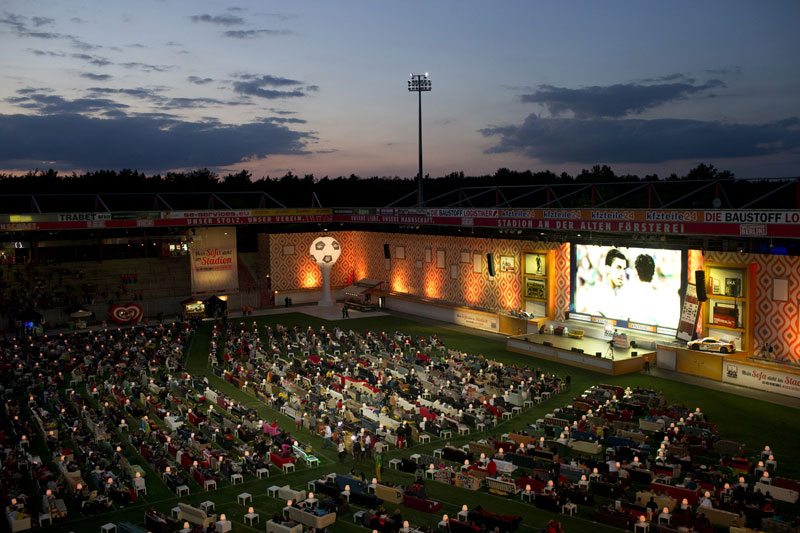Industry News Weekly Roundup
There was a lot of news this past week. Here are some stories that caught our eyes.
Stadium in Berlin Gets Transformed Into Giant Living Room for World Cup, Includes 700-inch Television
—TechEBlog
“Best of all, admission is free for the giant living room, known as WM Wohnzimmer, and it has room for up to 12,000 people.”
Dallas Summer Musicals Bolsters Theater Sound System with Technology for Hearing Impaired
—The Dallas Morning News
“The program offers hearing access in a number of ways, including a revamped sound system, upgraded and high-fidelity headsets, a loop system that is compatible with telecoils (known as t-coils) in hearing aids, and, the latest addition, frequency modulated (FM) ‘classroom compatible’ seating system, which is the same listening technology used in schools.”
World Cup 2014: Japanese Fans Clean Stadium After Losing 2-1 to Ivory Coast
—The Independent
“Despite seeing the Blue Samurais lose 2-1 against Didier Drogba’s team at the Arena Pernambuco in Recife, Japanese spectators armed with bin liners patrolled their side of the stadium and gathered up discarded litter…”
How to Manage Workplace Stress in Five Simple Steps
—The Guardian
“Stop telling yourself off and recognise what you need to be happy. And if all that fails, work out the cost to the bottom line and show your boss.”
How Data Beats Intuition at Making Selection Decisions
—Scientific American
“In predicting job performance, for instance, the predictions of hard data outperformed a combination of data and expert judgment by 50 percent.”
(Image: TechEBlog)
Are “Haters” Your Best Employees?
That grumpy person at your job may be your best worker. According to a new study published in Social Psychology, a person considered a “hater” may be a better employee because he spends time on fewer activities.
Researchers Justin Hepler (Department of Psychology, University of Illinois at Urbana-Champaign) and Dolores Albarracín (Annenberg School for Communication and Department of Psychology, University of Pennsylvania) found that people who like many things have a positive attitude and do more things during a week compared to people who dislike many things (the haters), who end up doing fewer things during the same time frame.
Helper and Albarracín showed in two studies that “likers” and haters don’t differ in the types of activities pursued, but that haters just do fewer of them and focused more time on their chosen activities.
“The present results demonstrate that patterns of general action may occur for reasons other than the desire to be active versus inactive,” the researchers wrote. “Indeed, some people may be more active than others not because they want to be active per se, but because they identify a large number of specific behaviors in which they want to engage.”
Helper and Albarracín suggest that these findings can be implemented in work strategies. For example, if you have a hater at work, find an activity he likes and let him focus his whole attention on it. He will develop better skills and be more productive.
He just may not be the most pleasant person to be around.
Industry Remembers Mark “Radar” Hennen
The industry is mourning the passing of FELD Entertainment’s Mark “Radar” Hennen, who lost is six-year battle with cancer on Sunday.
“Known for his compassion, gentleness, and unconditional love, Hennen was much revered by his friends, his family, and the hundreds of venues and industry executives he interacted with throughout his 18 years in the industry,” Dave Brooks wrote in a wonderful tribute in Venues Today.
IAVM Chairman John Bolton, CFE, and Hennen were close friends for nearly two decades.
“We hated negotiating with each other, but I loved hearing his sighs on the other side of the phone when I wouldn’t agree to what he wanted,” said Bolton, vice president for SMG Entertainment. “We would argue and mostly laugh back and forth until we had a deal both of us could live with going forward.”
Bolton said that one of the things he admired most about Hennen was his spirit and openness in sharing his journey with cancer.
“It really was an inspiration, and his positive attitude about it was truly eye opening,” Bolton said. “Last summer, we both ended up on Cape Cod for summer vacation at the same time. It was such a joy to see him there surrounded by his best friends having the time of his life. I’m so thankful I was there. ”
Christy Jacobs, IAVM’s director of marketplace sales, remembers meeting Hennen for the first time at VenueConnect in Fort Lauderdale, Florida.
“He walked up to me, smiled, and said ‘I’m Radar, now let’s talk toppings,'” Jacobs said. “We both laughed out loud, as he had totally caught me off guard. He was referring to the ice cream social that FELD hosts at our Arena Management Conference, and he wanted to make sure we didn’t have just the ‘typical sundae topping(s).’ He wanted a list of varieties and all of the options. He was a lot of fun to work with and he always had a wonderful, positive energy. Radar will be truly missed.”
I encourage you to read Brooks’ story about Hennen, and please share your favorite memories about him with us in the comment section.
(Image: Venues Today)
Naming Rights Awarded to Crystal Centre in Alberta, Canada
The Grande Prairie, Alberta, city council approved naming rights this week for The Crystal Centre to the Revolution Auto Group. The venue will soon change its name to Revolution Place. The five-year deal is worth $520,000 in cash and gift in kind.
Other name changes approved include the Bowes Family Crystal Gardens to now be called the Bowes Family Gardens and the Canada Games Arena to be renamed Revolution Arena. The deal also allows the auto group with box office naming, some exclusive signage rights, social and traditional media opportunities, and some preferred facility use. The auto group will promote up to three events on its own annually and include enhanced signage. A vehicle will be provided for venue business.
“It’s an exciting time for the city, our new partner, the Revolution Auto Group, and the venue,” said IAVM member Jane Cada-Sharp, general manager of the Crystal Centre. “Bigger and better things are definitely coming to Grande Prairie as we make venue and event history together.”
The agreement aligns with the city council’s plan to strengthen the city’s core, and it has already undertaken truss upgrade and rigging grid installation to permit heavier show production (lights and sound) loads.
“We’re so excited to be working with the City of Grande on this project and we will be active partners all along the way,” said Lionel Robins, CEO of the Revolution Auto Group. “We have provisions in the plans to promote events/concerts on our own and have committed to returning all profits back to the Revolution Place facility for any necessary upgrades that do not have to come from taxpayers or receive budgetary approval.”
Hall of Leaders Gala Tickets and Table Sponsorships Available
We let you know last month that IAVM member John Christison, principal and managing member at BCI+Network, was named a 2014 inductee into the Convention Industry Council (CIC) Hall of Leaders. Christison, along with two other inductees and two Pacesetter Award recipients, will be recognized at the Hall of Leaders Gala on Sunday, Oct. 12, 2014, at the MGM Grand Resort & Casino in Las Vegas.
“We are proud to support our industry professionals who have exhibited excellence in leadership skills to further enhance and improve the meetings and conventions world,” said Mike Dominguez, senior vice president of sales for MGM Resorts International. “We are proud at MGM Resorts to be trusted in creating an experience and evening of entertainment that makes for a memorable celebration for all of the honorees.”
Attending the gala is a great opportunity to network with industry peers and to show your support for CIC, which helps promote the value of meetings, conventions, exhibitions, and events. Tickets and table sponsorships are available for purchase.
Once again, congratulations John!
Do you want to receive a Front Row News weekly digest?
Categories
- Allied (861)
- Architecture (147)
- Arenas (747)
- Career (897)
- Convention Centers (895)
- Education (623)
- Events (1,544)
- Food & Beverage (193)
- Foundation (113)
- Guest Experience (1,496)
- Industry News (2,270)
- Leadership (1,888)
- Marketing (150)
- Membership (2,000)
- Music (213)
- Performing Arts Centers (454)
- Professional Development (409)
- Research (127)
- Safety & Security (442)
- Sports (763)
- Stadiums (608)
- Student (159)
- Technology (516)
- Ticketing (92)
- Touring (82)
- Trends (364)
- Uncategorized (753)
- Universities (218)
- Video (25)
- Young Professional (198)
Twitter Feed
- Twitter feed loading
Recent Posts
- College Park Center and Texas Hall Welcome Kristina Hill to Executive Director Role
- Cincinnati Convention Center Appoints Brian Clark as Assistant General Manager
- Capital One Arena Hosts Record-Setting PWHL Game, Highest-Attended In-Arena Game in U.S. Women’s Hockey History
- VenuWorks Appoints Local Arts Advocate Matt Hammond as Executive Director of Paramount Arts Center
- Dale Adams, CVE, Named Executive Director of Arizona State Fair
Categories
- Allied
- Architecture
- Arenas
- Career
- Convention Centers
- Education
- Events
- Food & Beverage
- Foundation
- Guest Experience
- Industry News
- Leadership
- Marketing
- Membership
- Music
- Performing Arts Centers
- Professional Development
- Research
- Safety & Security
- Sports
- Stadiums
- Student
- Technology
- Ticketing
- Touring
- Trends
- Uncategorized
- Universities
- Video
- Young Professional
Archives
- January 2026
- December 2025
- November 2025
- October 2025
- September 2025
- August 2025
- July 2025
- June 2025
- May 2025
- April 2025
- March 2025
- February 2025
- January 2025
- December 2024
- November 2024
- October 2024
- September 2024
- August 2024
- July 2024
- June 2024
- May 2024
- April 2024
- March 2024
- February 2024
- January 2024
- December 2023
- November 2023
- October 2023
- September 2023
- August 2023
- July 2023
- June 2023
- May 2023
- April 2023
- March 2023
- February 2023
- January 2023
- December 2022
- November 2022
- October 2022
- September 2022
- August 2022
- July 2022
- June 2022
- May 2022
- April 2022
- March 2022
- February 2022
- January 2022
- December 2021
- November 2021
- October 2021
- September 2021
- August 2021
- July 2021
- June 2021
- May 2021
- April 2021
- March 2021
- February 2021
- January 2021
- December 2020
- November 2020
- October 2020
- September 2020
- August 2020
- July 2020
- June 2020
- May 2020
- April 2020
- March 2020
- February 2020
- January 2020
- December 2019
- November 2019
- October 2019
- September 2019
- August 2019
- July 2019
- June 2019
- May 2019
- April 2019
- March 2019
- February 2019
- January 2019
- December 2018
- November 2018
- October 2018
- September 2018
- August 2018
- July 2018
- June 2018
- May 2018
- April 2018
- March 2018
- February 2018
- January 2018
- December 2017
- November 2017
- October 2017
- September 2017
- August 2017
- July 2017
- June 2017
- May 2017
- April 2017
- March 2017
- February 2017
- January 2017
- December 2016
- November 2016
- October 2016
- September 2016
- August 2016
- July 2016
- June 2016
- May 2016
- April 2016
- March 2016
- February 2016
- January 2016
- December 2015
- November 2015
- October 2015
- September 2015
- August 2015
- July 2015
- June 2015
- May 2015
- April 2015
- March 2015
- February 2015
- January 2015
- December 2014
- November 2014
- October 2014
- September 2014
- August 2014
- July 2014
- June 2014
- May 2014
- April 2014
- March 2014
- February 2014
- January 2014
- December 2013
- November 2013
- October 2013
- September 2013
- August 2013
- July 2013
- June 2013
- May 2013
- April 2013
- March 2013
- February 2013
- January 2013
- May 2012
- March 2012
- December 2011
- November 2011
- October 2011
Recent Comments
- Frank Bradshaw, Ph.D., CVE on John Meyer, CVE, a Tireless Advocate of Certification for Venue Professionals, Has Died
- Neil Sulkes on Hilary Hartung, Friend to Many in Venue Marketing, Has Left Us
- Jason Parker, CVE on The Devastation of Hurricane Helene and How We Can Support One Another
- Larry Perkins on Touhey Testifies Against Speculative Ticketing Before Congressional Subcommittee
- Peter Secord on Major Players for Planned Elkhart Amphitheater Were in the Mix at VenueConnect





